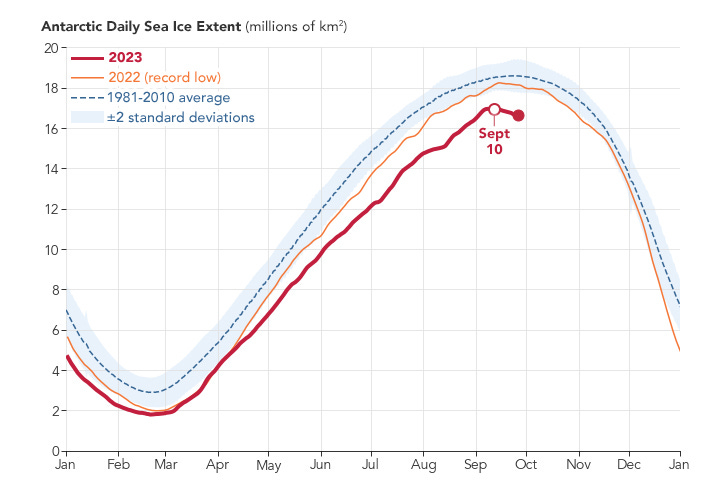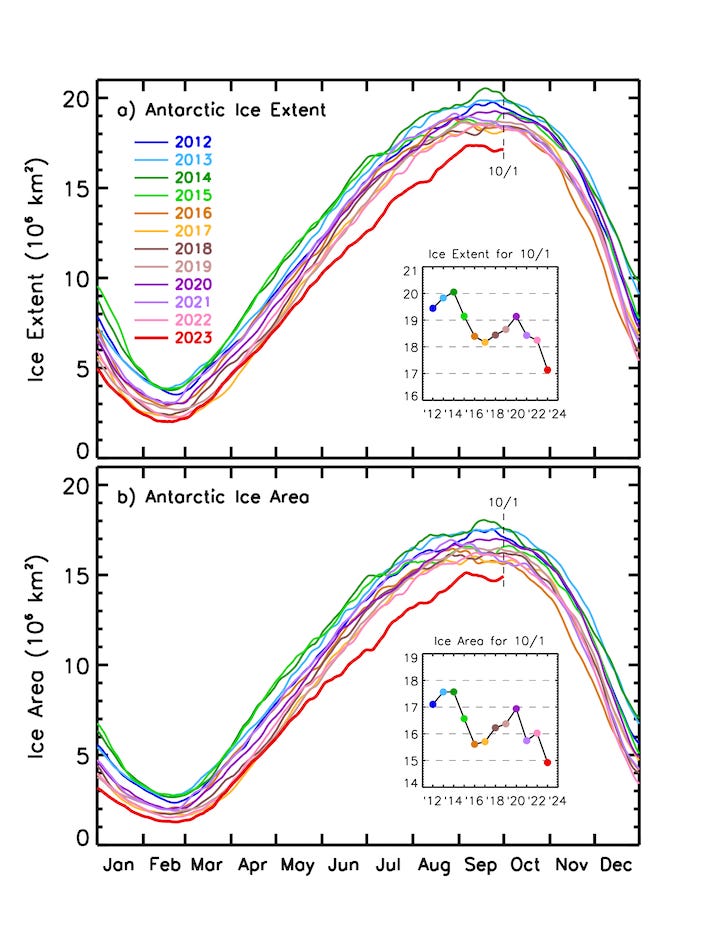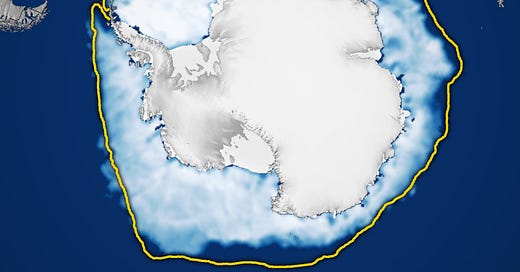NZ scientists alarmed by Antarctic sea ice slump
Antarctic researchers plead for dramatic cuts in climate emissions after emergency summit on alarming fall in sea ice extent around the frozen continent; Fall seven deviations from the mean
TL;DR: A group of researchers from Aotearoa-New Zealand have expressed deep alarm at the rate of change observed in Antarctic Sea Ice extent this year, urging an immediate and dramatic reduction in greenhouse gases.

Just 11 days out from the general election, the group pointed to the narrow, short-term, and changing nature of election priorities, and the lack of attention to climate change.
The scientists felt it was an important moment to highlight the significant shifts happening in Aotearoa’s backyard, which have the potential to affect almost all aspects of the lives of New Zealanders from food production and exports to landslips and flooding. They pointed out after an emergency summit yesterday that it also has a profound impact on nearly every other issue or debate that has been covered in this election period.
Climate change is insidious, they say.
“It weighs heavily. I don’t know that we necessarily signed up for this particular kind of role or place but we have a kind of unique position, our work has given us an awareness of this serious situation...it does keep me up at night” Professor Craig Stevens, NIWA
Antarctic sea ice extent has had “an alarming drop off the cliff” in 2023 relative to the satellite record of the last 45 years, according to Dr Natalie Robinson of NIWA. The reduction represents more than seven standard deviations from the mean - a statistic so extreme, she claims, that “you can't even use the statistics to describe it because, when you're getting to seven standard deviations out, it starts to lose all meaning… we're essentially missing between seven and 10 New Zealand's worth of sea ice.”

This is important because sea ice regulates the global climate system, helping to keep the environment habitable for humans. Melting sea ice is responsible for the ocean overturning currents that distribute heat, salt and nutrients throughout the oceans and absorb CO2 from the atmosphere. Sea ice also reflects heat back out into space that would otherwise be absorbed into dark ocean and is a solid substrate providing a habitat for organisms that form the basis of the ocean food chain, including krill and algae.
“It’s hard to look at the future that my children will experience and just with total awareness of the insufficiency of action we are taking” Dr Natalie Robinson, NIWA
The changes currently being observed have the potential to represent a ‘regime change’, or new normal, although this is not yet sufficiently proven to state with confidence. This will take time to establish within a relatively slow-moving scientific process.

An article published earlier this year in the journal Communications Earth & Environment1 suggests that persistence is favoured due to feedback mechanisms such as ice-albedo and ocean heat uptake. While it is not yet possible to entirely rule out the role of natural variability, the article points out that “the global climate implications of Antarctic meltwater are profound”, with far-reaching implications that highlight the urgency of greenhouse gas emissions reductions.
“I think we, as in scientists, we study the climate system and it is beautiful, right? When you see the earth, I see ice as a huge part of it, and it's like a beautiful living creature and it's unwell. We're poisoning it. We are doing so in full knowledge of what we are doing and that is upsetting and distressing.” Dr Sam Dean, NIWA
The group of researchers are from NIWA, The Antarctic Science Platform, the Universities of Auckland, Wellington, Canterbury & Otago and Te Pū Ao GNS Science and include:
Professors Craig Stevens & Wolfgang Rack with Drs Vonda Cummings, Billy van Uitregt, Miles Lamare, Adrian McDonald, Liz Keller, Sam Dean, Denise Fernandez, Ralph Chapman, Melissa Bowen, Andrew Pauling & Natalie Robinson.





Besides being an informative report of their ongoing research, it was a very affecting style of reporting their findings and conclusions. As regards the later I appreciated the remarks about his children and grandchildren. Like the professor I feel for all our children and it brought unexpected tears to see such worries confirmed. I'm also grateful for the absence of any 'value free' bullshit about scientific evidence. Their is no absolute certainty but the probable truth about the consequences of CC should not only worry us all, but move all of us,
including our political leaders and profiteering oligarchs to act urgently and effective NOW!
Thank you to these scientists for speaking out on behalf of the beautiful world humans are destroying. When seeing our natural world with clarity is your day job you feel this terrible degradation to the core - there is no pretending it doesn't exist and no escaping the knowledge of the consequences it will trigger ready or not. No relief to be gained via talking up imaginary solutions and fake actions with an eye on some mythical result come 2030 or 2050 by doing more of the same.